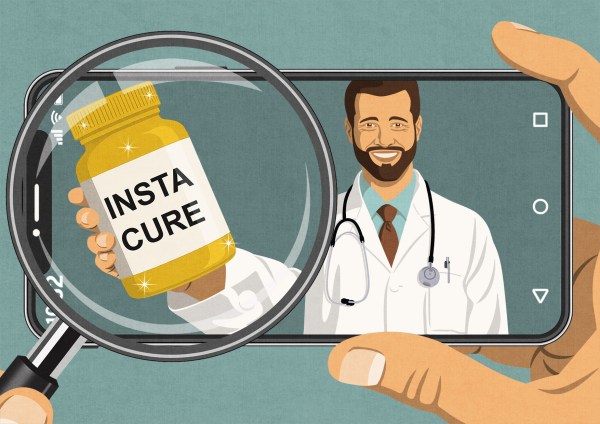Puberty hit Casey Means like it hits a lot of us: acne, anxiety, rapid weight gain. By eighth grade, she weighed 210 pounds, and the next year she had to face high school, one of the harshest image-policing institutions known to man.
But when faced with this menace, she didn’t do what many girls her age do. Instead, she signed herself up for a “summer of health,” cooking all her meals based on nutrition books and joining a gym. She did all of the things that people know they’re supposed to do for their well-being but somehow never quite manage. She worked off the pounds and became a certifiable health nut.
Means knew she wanted to study medicine, and Stanford and a residency in ear, nose, and throat surgery taught her more about what was wrong with Americans’ health than what was right. Eventually, she dropped out of her residency program and turned to functional medicine, the idea that better nutrition is the cure for not just weight problems, but all of the chronic diseases plaguing an increasingly sedentary and overnourished society. The problem, she began to believe, was not just couch potatoes eating chips and then getting the heart disease they deserved. It was systemic: massive food companies hooking people on ultra-processed food and then the medical industry bankrupting them to treat the resulting diseases.
Now in her late 30s, Means is the co-founder of the health company Levels and a prominent health influencer—so prominent that President Donald Trump has nominated her to be surgeon general of the United States. She and her brother Calley Means are leading nutrition advocates in the conventional sense: As top advisers to Robert F. Kennedy Jr. since his 2024 presidential bid with its promise to Make America Healthy Again, they lobby for MAHA-approved goals such as removing allegedly toxic food dyes from processed foods, banning sugary drinks from SNAP programs, and rerouting farm subsidies from corn, soy, and tobacco to fruits and vegetables.
But in testimony during a Senate hearing on chronic disease and nutrition last fall, she connected our physical woes to something even bigger: “What we are dealing with here is so much more than a health crisis. It’s a spiritual crisis.”
The belief that our eating habits have not just material but moral and spiritual significance is at the center of the wellness industry in the digital age—and it’s a belief that Means has helped bring to the mainstream. Gwyneth Paltrow, Hannah Neeleman (of Ballerina Farm fame), Bryan Johnson (of immortality fame): Means is riding a wave of wellness influencers. But what’s most remarkable about this crop of creators is not just that they’re making bank off of the exploding wellness industry (though it’s true—the global wellness economy is valued at $6.3 trillion per year and is expected to grow to $9 trillion in the next three years). It’s that these wellness influencers represent a new generation of morality salesmen, marketing the idea that health is something you can buy—and that virtue is part of the package when you purchase their products, and poor health is part of your punishment when you don’t. And it seems that Means’ political career may make her one of the first of her kind to fully escape the social media sphere and shape national politics in the wellness industry’s image.
America’s wellness regime has always had a religious cast to it. Jean Nidetch was the country’s first weight-loss guru: She co-founded Weight Watchers in the early 1960s after losing 70 of her 214 pounds. Someone at the grocery store had asked about her due date, and that was enough to push her off the cycle of dieting and bingeing and build a group for mutual support—and sometimes shame—among people who wanted to lose weight.
Community was the positive side of Weight Watchers groups. People could speak frankly about their struggles with eating and exercising. “There had to be a miracle that was going to make me look at a cupcake and say, ‘I hate it!’ And that was what I was looking for, a miracle,” Nidetch wrote in her memoir. The name of that miracle was accountability: Members paid to attend meetings, undergo regular weigh-ins, and follow the company’s nutrition plans (in which, at least at first, milk was always skim and dessert was always sugar-free Jell-O).
Nidetch and her co-founders monetized that miracle, turning Weight Watchers into a multi-million-dollar behemoth with, as it seemed by its heyday in the 1970s, the entire nation as its grateful followers. It helped that Nidetch was a housewife from Queens: Forthright to a fault, she would dole out tough-love koans like “Most fat people need to be hurt badly before they do something about themselves” and advise hostesses to “blow out the candles, serve the cake to your guests and then have half a grapefruit.” In the Weight Watchers view, maintaining a healthy weight requires constant vigilance against overeating—a mindset seemingly lifted from Christianity, with its exhortations to avoid sin and near occasions of it. Nidetch divided the world into “civilians” and soldiers who go to “war” against weight. She was happy to employ vice in that fight: “Vanity,” she claimed: “There is no more compelling reason to lose weight.”
Nidetch was no less than a spiritual guide for many. For her and her followers, her New York Times obituary said, weight loss was a “quasi-religious quest.”
This religion was a heavily moralistic one, and its road to hell was as wide as the door to dieters’ refrigerators: “Do not dig your own grave with your own fork,” early guidelines warned. Certain foods were bad—including dressings, smoked foods, cereals, nuts, bananas, and even watermelon—and if you ate them, you would look bad and live poorly. But if dieters persevered in substituting good foods (lots of cucumbers, lettuce, and grapefruit) for evil ones, “just as you always reached for the wrong food in the past, you will now think only in terms of your proper eating habits.” It’s fairly simple to swap “fat” for “sinful” and “thin” for “righteous” and find the source of this religion: It was a secularized Puritanism, tuned to the body instead of the soul. And the welfare of both was heavily policed by one’s peers.
All this vigilance may well have been worth it if it had delivered the promised salvation. But it could offer no guarantee: Weight Watchers members would often lose weight in the short term, but regain it in the long term. The nation’s obesity rates kept on rising, but since the central premise—fat is bad; thin is good—was so powerful, members and those with similar goals simply went looking for new spiritual guides.
That’s why, although Ozempic has put the nail on Weight Watchers’ coffin, its black-and-white proscriptions still live on in narratives about weight loss and health. The motivational speaker and food coach Michelle Petties, for instance, sees food intake as an outcome of belief. Once, she was an emotional eater who gave in to cravings. But “now, when I see the stuff I’m looking at, it is poison,” she said in an interview, referring to the candy under the checkout counter at the pharmacy. “This poison is not good. It is evil.” The way to fight this temptation is to change not just one’s actions, but one’s beliefs: “Willpower will always fail you. But your belief system will not.” As she sees it, only when people root out their desire for fattening food will they be free, and able to live well.
These beliefs aren’t limited to Weight Watchers members and motivational speakers. Journalist Amy Larocca tasked herself with following Instagram wellness regimens for her recent book How to Be Well: Navigating Our Self-Care Epidemic One Cure at a Time. She found that, at root, what the “gospel of wellness” promises to an increasingly “spiritual but not religious” population is “transcendence”—of one’s genetic predisposition, or ingrained habits, or the ravages of time.
SoulCycle classes came complete with admonitions to “Ride and pray!” and “Love ourselves . . . Love and justice for all!” Peloton’s founder, John Foley, explained the popularity of spinning: “In the ’70s or ’80s, you’d have a cross or Star of David around your neck. Now you have a SoulCycle tank top. That’s your identity, that’s your community, that’s your religion.” But for Larocca, while the camaraderie of fitness classes was nice, the spirituality was ultimately a “handy overcoat for narcissism”: Do the work, and the world will love you back. But will it really, or is a workout sometimes just a workout?
Private health routines went to even more extreme lengths to achieve virtue through one’s body: A colonic promised to rid Larocca of “all the filth you cannot see.” She looked into the science behind it: doubtful. But the friend who recommended it, and the other true believers in the practice, insisted on its miraculous effects. It was, Larocca wrote, like they needed to believe.
It’s a “seductive blend of hypochondria and buying stuff,” Larocca writes of today’s wellness industry. While on its face, the message of those promoting these cures is positive and aspirational, much of it is based on defining good health in opposition to evil substances that allegedly threaten it. “After all this research I don’t fundamentally believe that the levels of toxic exposures in most common household products are dangerous,” she writes, “but I also can’t get past the gnawing what if, what if.”
An additional feature of today’s wellness zeitgeist is its pervasiveness: Gone are the days when one could, à la Weight Watchers, simply avoid generic categories of unhealthy “bad foods.” Now there are bad brands (Oreos, McDonald’s, DiGiorno), bad additives (high fructose corn syrup, Red 40, both artificial and natural flavors), and bad processing techniques (don’t even think about baking with bleached flour). And with Google and innumerable health apps at our fingertips, the implication of all this alarming information is that we are personally responsible for avoiding every toxin from food to water to deodorant and fingernail polish.
The solution is to pursue a more expansive kind of purity: According to Means, eating organic and gluten-free—and buying her products—promote “Good Energy” in one’s cells and protect against disease. And the stakes are as universal as they are personal, because the alternative to optimizing one’s health—and the health of one’s family, especially one’s children—is not only disease and death, but the collapse of our environment and the explosion of our ongoing chronic disease epidemic. The end of the world, or to put it into more religious terms: the apocalypse.
With so many evils surrounding the health-conscious consumer, even Means isn’t optimistic about the “Good Energy” part of her wellness gospel. In a recent documentary, she described a study that tested what kind of messages about ultra-processed food would convince teenage boys to stop buying junk from vending machines. “You could teach people all day about the health effects of the food and how it’s going to cause obesity and it didn’t matter,” she said. The message that worked was this: “You are being used by a machine that wants to take advantage of you. That was the thing. And I’m like, that is what it is for me too.” Like Nidetch, Means seems to see herself as engaged in a holy war against the forces of Bad Food. The difference is that in the digital era, bad food is not just a passive temptation but an active force: The devil is behind Bad Food, and if you don’t resist it, bad health will come for you.
If that’s the case, it’s worth considering what is actually the healthy response to the choice between the chronic disease apparently ensured by the status quo and the bleak spirituality pushed by the new health influencers.
The idea that physical health is connected to spiritual health is not new: The influencer who gave us the idea of the body as a temple was none other than St. Paul. But he decried not “sinfully delicious” foods or the evil system that accosts us with them, but actual sin. And for those who welcomed the Spirit, there was something larger than an endless war against gluttony: there was salvation, which involved spiritual growth.
In contrast, today’s wellness gospel seems deathly thin: Obsessed with the ills of the body, it can’t offer anything more than escape from the “evil” of physical imperfection. And the ultimate irony is that the wellness industry’s very materialism keeps it from delivering on even that promise: If an influencer managed by some miracle to deliver perfect health, what would be left to sell? Easier to keep reminding people of the mortal dangers of ignoring the gospel of health.
Casey Means writes in Good Energy that she wants to restore “the miraculous relationship between food and my body,” and that her book gives readers a “superpower” to fight ill health in “a world where the deck is stacked against us.” But by tying the wellness gospel to politics, and selling it in an alarmist industry with a track record of marketing dubious miracles, she may be adding yet another card to the pile.






Please note that we at The Dispatch hold ourselves, our work, and our commenters to a higher standard than other places on the internet. We welcome comments that foster genuine debate or discussion—including comments critical of us or our work—but responses that include ad hominem attacks on fellow Dispatch members or are intended to stoke fear and anger may be moderated.
With your membership, you only have the ability to comment on The Morning Dispatch articles. Consider upgrading to join the conversation everywhere.